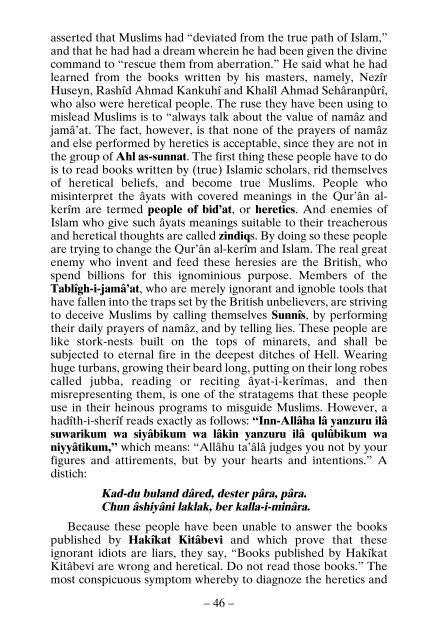Belief and Islam
BELIEF AND ISLAM star This work, Belief and Islam, originally was written in Persian under the title I’tiqâd-nâma by Hadrât Mawlânâ Khâlid al-Baghdâdî, a profound ‘âlim of Islam and a specialist in ma’ârif of tasawwuf. Hâji Faydullah Effendi of Kemah, a khalîfa of great walî Mavlânâ Mahmûd Sâhib, the brother of the author, translated the book into Turkish and named it Farâid-ul-fawâid which was printed in Istanbul in 1312 A.H.[1894]. Our bookstore had it translated again from the Persian original into Turkish and, some explanations and three chapters, published it with the title Imân ve Islâm in 1966. German, French and Arabic versions are also published by our bookstore. This book, explains five fundamentals of Islam, six fundamentals of îmân and the contemporary information about the matter and refutes those who are against Islam and those who are lâ-madbhabî.
BELIEF AND ISLAM
star This work, Belief and Islam, originally was written in Persian under the title I’tiqâd-nâma by Hadrât Mawlânâ Khâlid al-Baghdâdî, a profound ‘âlim of Islam and a specialist in ma’ârif of tasawwuf. Hâji Faydullah Effendi of Kemah, a khalîfa of great walî Mavlânâ Mahmûd Sâhib, the brother of the author, translated the book into Turkish and named it Farâid-ul-fawâid which was printed in Istanbul in 1312 A.H.[1894]. Our bookstore had it translated again from the Persian original into Turkish and, some explanations and three chapters, published it with the title Imân ve Islâm in 1966. German, French and Arabic versions are also published by our bookstore. This book, explains five fundamentals of Islam, six fundamentals of îmân and the contemporary information about the matter and refutes those who are against Islam and those who are lâ-madbhabî.
You also want an ePaper? Increase the reach of your titles
YUMPU automatically turns print PDFs into web optimized ePapers that Google loves.
asserted that Muslims had “deviated from the true path of <strong>Islam</strong>,”<br />
<strong>and</strong> that he had had a dream wherein he had been given the divine<br />
comm<strong>and</strong> to “rescue them from aberration.” He said what he had<br />
learned from the books written by his masters, namely, Nezîr<br />
Huseyn, Rashîd Ahmad Kankuhî <strong>and</strong> Khalîl Ahmad Sehâranpûrî,<br />
who also were heretical people. The ruse they have been using to<br />
mislead Muslims is to “always talk about the value of namâz <strong>and</strong><br />
jamâ’at. The fact, however, is that none of the prayers of namâz<br />
<strong>and</strong> else performed by heretics is acceptable, since they are not in<br />
the group of Ahl as-sunnat. The first thing these people have to do<br />
is to read books written by (true) <strong>Islam</strong>ic scholars, rid themselves<br />
of heretical beliefs, <strong>and</strong> become true Muslims. People who<br />
misinterpret the âyats with covered meanings in the Qur’ân alkerîm<br />
are termed people of bid’at, or heretics. And enemies of<br />
<strong>Islam</strong> who give such âyats meanings suitable to their treacherous<br />
<strong>and</strong> heretical thoughts are called zindiqs. By doing so these people<br />
are trying to change the Qur’ân al-kerîm <strong>and</strong> <strong>Islam</strong>. The real great<br />
enemy who invent <strong>and</strong> feed these heresies are the British, who<br />
spend billions for this ignominious purpose. Members of the<br />
Tablîgh-i-jamâ’at, who are merely ignorant <strong>and</strong> ignoble tools that<br />
have fallen into the traps set by the British unbelievers, are striving<br />
to deceive Muslims by calling themselves Sunnîs, by performing<br />
their daily prayers of namâz, <strong>and</strong> by telling lies. These people are<br />
like stork-nests built on the tops of minarets, <strong>and</strong> shall be<br />
subjected to eternal fire in the deepest ditches of Hell. Wearing<br />
huge turbans, growing their beard long, putting on their long robes<br />
called jubba, reading or reciting âyat-i-kerîmas, <strong>and</strong> then<br />
misrepresenting them, is one of the stratagems that these people<br />
use in their heinous programs to misguide Muslims. However, a<br />
hadîth-i-sherîf reads exactly as follows: “Inn-Allâha lâ yanzuru ilâ<br />
suwarikum wa siyâbikum wa lâkin yanzuru ilâ qulûbikum wa<br />
niyyâtikum,” which means: “Allâhu ta’âlâ judges you not by your<br />
figures <strong>and</strong> attirements, but by your hearts <strong>and</strong> intentions.” A<br />
distich:<br />
Kad-du bul<strong>and</strong> dâred, dester pâra, pâra.<br />
Chun âshiyâni laklak, ber kalla-i-minâra.<br />
Because these people have been unable to answer the books<br />
published by Hakîkat Kitâbevi <strong>and</strong> which prove that these<br />
ignorant idiots are liars, they say, “Books published by Hakîkat<br />
Kitâbevi are wrong <strong>and</strong> heretical. Do not read those books.” The<br />
most conspicuous symptom whereby to diagnoze the heretics <strong>and</strong><br />
– 46 –

















